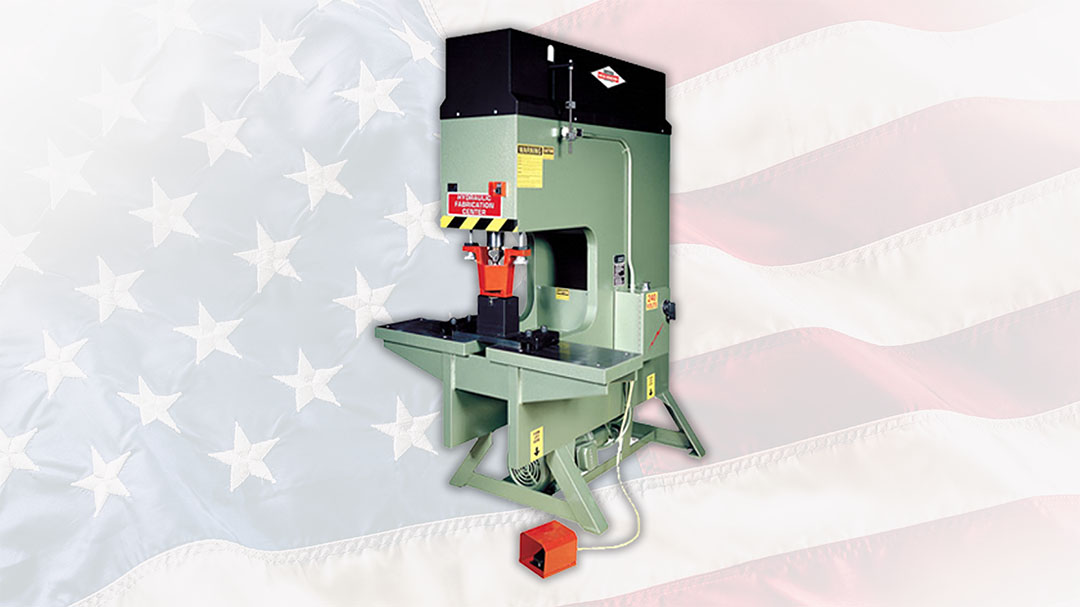
Here’s what you need to know before you shop for a hydraulic punch press.
As mentioned above, a punch press is a versatile machine that plays a crucial role in metalworking operations for many different businesses. At their core, punch presses are designed to cut, pierce, bend, or form sheet metal into specific shapes and sizes. These machines come in different types, each offering unique capabilities and advantages.
One of the fundamental is their power source. Mechanical punch presses utilize mechanical force generated by a motor and flywheel to perform punching operations. Hydraulic punch presses, on the other hand, rely on hydraulic fluid to generate the necessary force, providing smoother and more precise control over the punching process. Servo-driven punch presses combine the benefits of mechanical and hydraulic systems, offering high-speed precision with minimal energy consumption.
Punch presses also vary in terms of their size and capacity. The tonnage of a punch press refers to the amount of force it can exert on the material during the punching process. Determining the required tonnage depends on factors such as the material type, thickness, and size of the components being produced. Sheet size compatibility is another crucial consideration, as it dictates the maximum dimensions of the material that can be processed by the punch press.
Understanding these key distinctions and factors is essential for selecting the right punch press that meets your specific production requirements and operational needs. Whether you prioritize speed, precision, versatility, or cost-effectiveness, choosing the appropriate type and size of punch press will ultimately contribute to the efficiency and success of your metalworking operations.
When for your manufacturing operations, several key factors must be carefully considered to ensure optimal performance and efficiency. One of the primary considerations is the capacity and size of the punch press. This includes determining the required tonnage based on the material type and thickness, as well as assessing the machine’s sheet size compatibility to accommodate the dimensions of the components being produced.
These are equally crucial factors in punch press selection. Achieving tight tolerances and consistent repeatability is essential for maintaining product quality and minimizing waste. This involves evaluating the machine’s alignment and control systems to ensure precise positioning and punching accuracy throughout the production process.
Different types of tooling, such as punches and dies, are used to perform various punching and forming operations. Assessing the compatibility of the punch press with existing tooling systems and the availability of interchangeable tooling options can significantly impact productivity and versatility in manufacturing operations.
Cycle times and production rates determine the machine’s throughput capacity and overall productivity. Additionally, the integration of automation features and productivity enhancements can further streamline production processes and minimize downtime, ultimately maximizing throughput and profitability.
A punch press that can handle a wide range of materials, thicknesses, and component sizes offers greater flexibility in manufacturing operations. Quick changeover capabilities and the ability to accommodate diverse production needs can significantly enhance operational efficiency and responsiveness to customer requirements.
Assessing the durability and robustness of the punch press, as well as evaluating the ease of maintenance and availability of spare parts, is critical for mitigating the risk of unexpected breakdowns and ensuring consistent performance over time.
Compliance with safety standards and the integration of safety mechanisms are essential for protecting operators and preventing accidents in the workplace. Prioritizing the safety of personnel and equipment is crucial for creating a secure and productive manufacturing environment.
When you need a machine, our punch press builder is here to guide you through every step of the process. Contact us online or call (269) 492-0268 today and someone from our Kalamazoo Metal Muncher team will reach out to you as soon as possible.